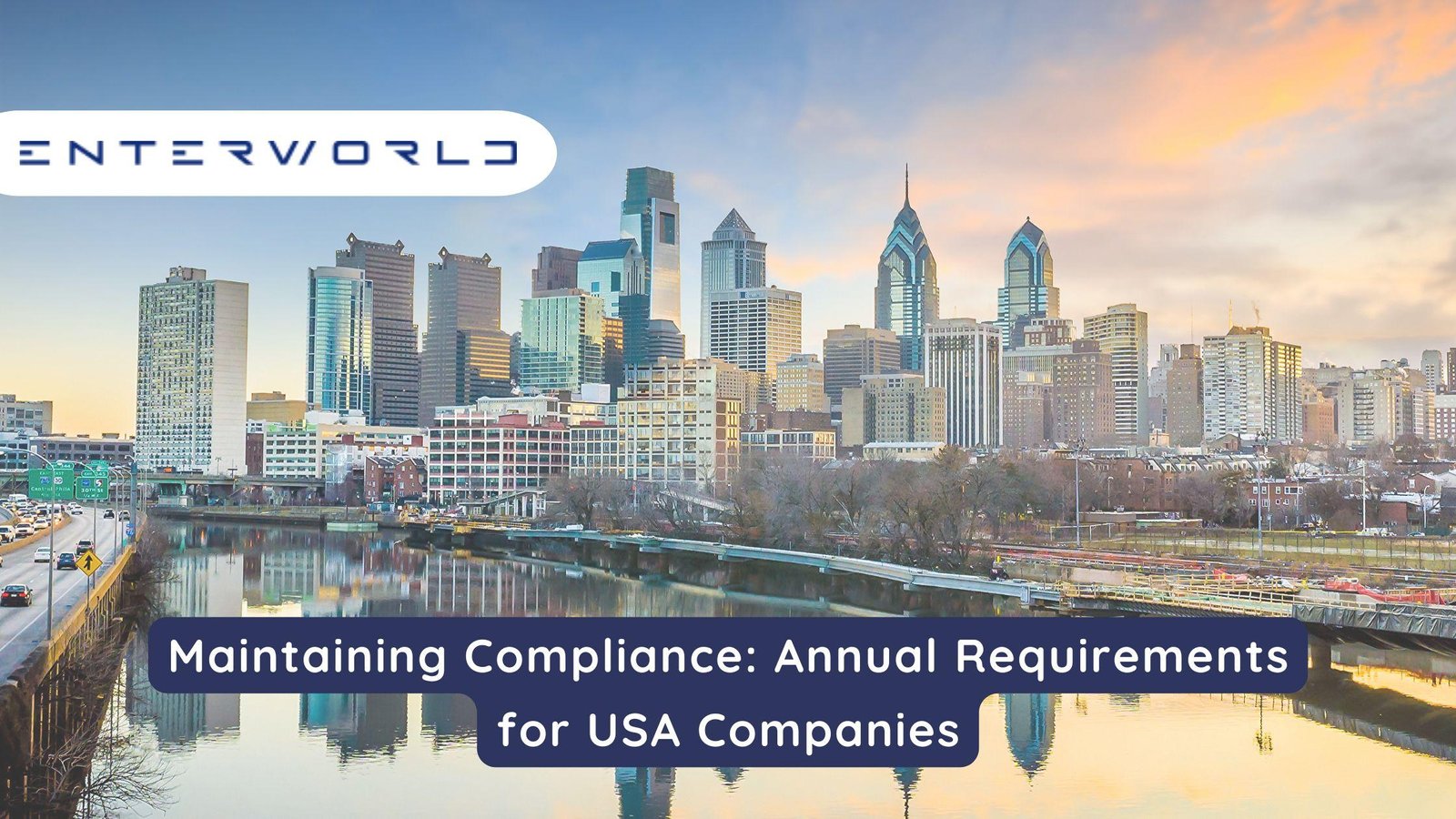-
Web sayfası bildirimcisi
- EXPLORE
-
Blogs
-
Events
Maintaining Compliance: Annual Requirements for USA Companies

Starting a business in the United States is just the beginning. To ensure long-term success and avoid legal or financial setbacks, companies must remain in good standing by meeting a range of annual compliance obligations. Whether you're operating a corporation, LLC, or foreign entity doing business in the U.S., these requirements are non-negotiable.
This guide walks you through the critical annual compliance duties U.S. companies must fulfill, why they matter, and how to stay on top of them—especially after completing your company registration in US jurisdictions.
Why Annual Compliance Matters
Annual compliance isn't just a formality. It's a legal necessity that keeps your business in good standing with federal, state, and sometimes local authorities. Failing to meet these obligations can lead to:
-
Penalties or late fees
-
Loss of limited liability protection
-
Suspension or revocation of business licenses
-
Difficulty raising capital or securing contracts
In short, staying compliant ensures your company remains legally recognized and operational following company registration in US states.
1. Annual Report Filing
What it is: Most U.S. states require corporations and LLCs to file an annual (or biennial) report with the Secretary of State or equivalent office.
What it includes:
-
Company name and principal address
-
Names and addresses of directors or members
-
Registered agent details
-
Confirmation of business activity
Deadlines: Vary by state. For example, Delaware’s annual report for corporations is due by March 1, while Florida requires annual reports by May 1.
Filing Fee: Usually between $50–$500 depending on the state and entity type.
Why it matters: It updates your company's information and confirms your intent to continue operating in the state where you completed your company registration in US.
2. Federal and State Tax Returns
Corporations: Must file Form 1120 (C Corp) or Form 1120S (S Corp) with the IRS annually.
LLCs:
-
Single-member LLCs: Typically file Schedule C as part of the owner’s personal Form 1040.
-
Multi-member LLCs: File Form 1065 with accompanying K-1s for each member.
State Taxes: Many states also require separate income or franchise tax filings, even if your federal tax burden is minimal.
Deadlines:
-
Corporations: March 15 for S Corps, April 15 for C Corps.
-
LLCs: Usually April 15 unless the company elected to be taxed as a corporation.
Why it matters: These filings are essential to maintain good standing and financial health after your company registration in US jurisdictions.
3. Franchise Taxes or Business Privilege Taxes
Some states charge a franchise tax or business privilege tax for the right to do business in the state. It’s not based on income, but on factors such as net worth, capital stock, or revenue.
Examples:
-
Delaware charges an annual franchise tax on corporations (based on share structure).
-
Texas levies a margin tax on most entities.
-
California imposes a minimum franchise tax of $800 for LLCs and corporations.
Why it matters: These taxes are typically due regardless of whether you made a profit, and compliance is expected post company registration in US.
4. Annual Meeting and Corporate Minutes (Corporations)
While not required for LLCs, corporations are typically required to hold an annual shareholder meeting and record the meeting minutes.
What it includes:
-
Election of directors and officers
-
Financial performance discussions
-
Major company decisions or resolutions
Why it matters: Keeping these records maintains the corporate veil established during company registration in US states.
5. Business License Renewals
If your business holds state or local licenses (e.g., a sales tax permit, health permit, or professional license), check if annual renewal is required.
Typical renewals include:
-
Local business operation licenses
-
Industry-specific licenses (legal, real estate, medical, etc.)
-
Reseller or sales tax permits
Why it matters: These licenses are a legal continuation of your initial company registration in US and must be renewed to operate lawfully.
6. Registered Agent Maintenance
Every U.S. business entity must have a registered agent on file in the state of formation (and any states where it's registered to do business).
Annual checks:
-
Is your registered agent still valid and available?
-
Have they changed address or status?
Why it matters: Failure to maintain an active registered agent can nullify your company registration in US records and result in penalties.
7. Beneficial Ownership Reporting (Starting 2024)
Under the Corporate Transparency Act, most U.S. companies formed after January 1, 2024, must report their beneficial owners to the Financial Crimes Enforcement Network (FinCEN).
Who is affected:
-
LLCs and corporations unless exempt (e.g., large operating companies)
-
Individuals owning 25%+ or exercising significant control
Why it matters: This requirement builds on the transparency expectations set during your company registration in US federal systems.
8. Maintaining Good Standing in Multiple States
If your company is registered (foreign qualified) in more than one state, you must meet annual compliance obligations in each state.
Examples:
-
File annual reports in all registered states
-
Pay franchise taxes as applicable
-
Maintain separate registered agents
Why it matters: Multi-state compliance is an extension of your company registration in US and supports broader operational legitimacy.
9. Updating Operating Agreements and Bylaws
While not a state filing requirement, it’s good practice to review and, if necessary, update your:
-
Operating Agreement (LLC)
-
Corporate Bylaws (Corporation)
Why it matters: These internal documents should evolve with your business and stay consistent with your entity’s original company registration in US jurisdictions.
Tips to Stay Compliant Year-Round
-
Use a compliance calendar to track deadlines.
-
Hire a registered agent or compliance service.
-
Work with an accountant for tax compliance.
-
Review corporate governance documents annually.
-
Retain all business records for future reference.
Conclusion
Annual compliance is essential to protecting the integrity and status of your company after completing company registration in US states. From timely tax filings and report submissions to maintaining licenses and governance protocols, these ongoing responsibilities play a vital role in keeping your business legally viable and operational.
By planning ahead and engaging the right advisors, you can ensure that compliance doesn’t become a burden but rather a seamless part of running a successful U.S. company.
FAQs
1. What happens if I miss an annual report filing?
You may face late fees, loss of good standing, or even business dissolution. It’s a key component of staying compliant after your company registration in US.
2. Do LLCs need to hold annual meetings like corporations?
Not required in most states, but it’s recommended to document major decisions, especially to maintain formal protections post-registration.
3. How can I check my company’s compliance status?
You can check your status on your state’s Secretary of State website, which reflects all updates post your company registration in US databases.





